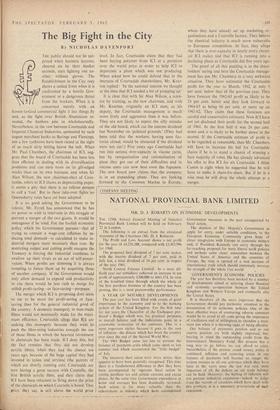The Big Fight in the City
By NICHOLAS DAVENPORT Turn public should not be sur- prised when business tycoons, cheered on by their banker seconds, start fighting one an- other without gloves. The Establishment in the City only shows a united front when it is confronted by a hostile Gov- ernment or a dangerous threat from the workers. When it is concerned merely with an honest-to-God commercial fight it lets things fly and, as the fight over British Aluminium re- vealed, the bankers join in wholeheartedly. Nevertheless, in the row between Courtaulds and Imperial Chemical Industries, sponsored by such august merchant banks as Barings and Flemings, not a few eyebrows have been raised at the sight of so much dirty hitting below the belt. When Mr. Paul Chambers, the chairman of ICI, sug- gests that the board of Courtaulds has been less than efficient in dealing with its diversification problems and can earn more on its gilt-edged stocks than on its own business, and when Sir Alan Wilson, the new chairman-elect of Cour- taulds, refers to ICI shares as depreciating paper, it seems a pity that there is no referee present to call a 'foul.' But in these take-over fights no Queensberry rules have yet been adopted.
It is no good asking the Government to be referee. Mr. Erroll has announced that he has no power or wish to intervene in this struggle or prevent a merger of the two giants. It would be outrageous if he tried. For the foolish economic policy which his Government pursues—that of trying to contain a wage-cost inflation by re- ducing total demand—is calculated to make in- dustrial mergers more necessary than ever. By restricting output and cutting profit margins the Treasury is forcing the industrial combines to swallow up their rivals as an act of self-preser- vation. When profits are slimming it is always tempting to fatten them up by acquiring those of another company. If the Government would only allow demand to expand and productivity to rise there would be less rush to merge for selfish profit-saving--or face-saving—purposes.
The merger which ICI is proposing does seem to me to be more for profit-saving or face- saving than for the general industrial good of the country. A domestic monopoly in man-made fibres would not necessarily make for the maxi- mum efficiency. Courtaulds allege that ICI are seeking this monopoly because they want to push the fibre-using industries towards the use of those fibres in which the heaviest investment in chemicals has been made. ICI deny this, but the fact remains that they did not develop acrylic fibres, when they had the chance ten years ago, because of the huge capital they had invested in nylon and terylene (the patents of which are shortly running out). Courtaulds are now having a great success with Courtelle, the first British acrylic fibre, and they claim that ICI have been reluctant to tiring down the price of the chemicals on which Courtelle is based. That price, they say, is still above the world price level. In fact, Courtaulds claim that they had been buying polymer from ICI at a premium over the world price in order to help ICI to depreciate a plant which was not producing. When asked how he could defend that in the interests of Courtaulds shareholders, Mr. Kear- ton replied: 'In the national interest we thought at the time that ICI needed a bit of propping up.'
It is clear that with Sir Alan Wilson, a scien- tist by training, as the new chairman, and with Mr. Kearton, originally an ICI man, as his deputy, the Courtaulds management is much' more lively and aggressive than it was before. They are not likely to repeat the silly mistake of the old board, which cut the interim dividend last November on 'political grounds.' (They had been told that the workers, having seen fac- tories closed, would be alienated if the dividend were not cut!) Five years ago Courtaulds had run into serious over-capacity in viscose yarns, but by reorganisation and rationalisation of plant they got out of their difficulties and in viscose costs can now beat even the Japanese. The new board now claims that the company is in an expanding phase. They are looking forward to the Common Market in Europe, where they have already set up marketing or- ganisations and a Courtelle factory. They believe the chemical industry is much more vulnerable to European competition. In fact, they allege that there is over-capacity in nearly every chemi- cal ICI makes and that ICI is running into a declining phase as Courtaulds did five years ago.
The proof of all this pudding is in the share- holders' eating and here the Courtaulds manage- ment has put Mr. Chambers in a very awkward situation. They have estimated the Courtaulds profit for the year to March, 1962, at only 5 per cent. below that of the previous year. They have forecast the 1962-63 profit as likely to be 24 per ,cent. better and they look forward to 1964-65 as being 60 per cent. or more up on 1961-62. They claim that these forecasts are careful and conservative estimates. Now ICI have not yet disclosed their profit for the second half of 1961. In the first half it was 24 per cent. down and it is likely to be further down in the second. If the Courtaulds estimate of profit is to be regarded as reasonable, then Mr. Chambers will have to increase his bid for Courtaulds shares if he is to stand a chance of winning a bare majority of votes. He has already advanced his offer to five ICI for six Courtaulds. I think Custos is right when he suggested that he will have to make it share-for-share. But if he is a wise man he will drop the whole attempt at a merger.


































 Previous page
Previous page